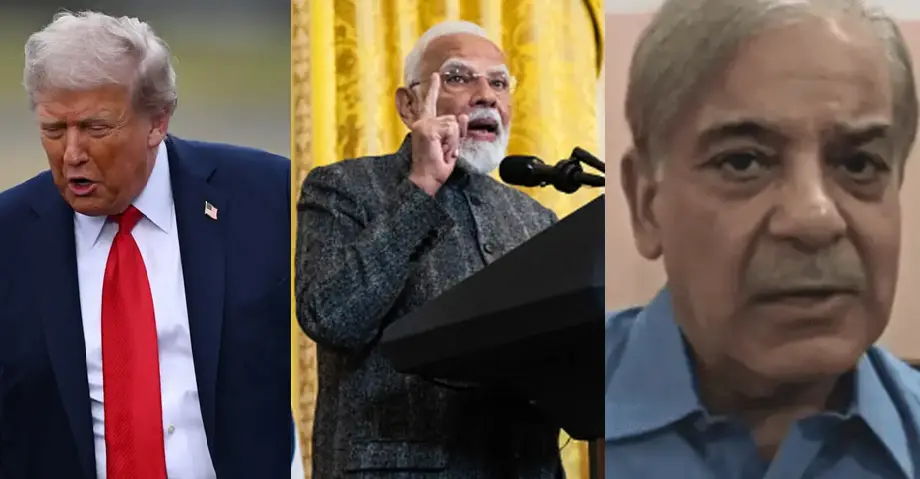
Trump claims credit for India-Pakistan peace deal, but India denies U.S. involvement
The Great Mediation Mirage – U.S. President Donald Trump has never been shy about claiming credit for global peace efforts. From North Korea to the Middle East, his boasts have often made headlines and raised eyebrows. But one of his most persistent and controversial claims involves the long-standing tensions between India and Pakistan. According to Trump, he single-handedly prevented a nuclear war between the two South Asian rivals. The truth, however, is far more complicated.
The Claim That Keeps Coming Back
In a recent interview on Fox News, Trump once again revisited his alleged role in brokering peace between India and Pakistan. He painted a dramatic picture of near-catastrophe:
“They were shooting down airplanes already. And that would have been maybe nuclear. I would have said it was gonna get nuclear, but I was able to get it done. Number one is lives, number two is everything else.”
He went on to suggest that his administration both used trade leverage to pressure countries into a ceasefire, reportedly telling them:
“We’re not going to do a deal unless you make peace.”
This isn’t the first time Trump has made such claims. During his presidency, he repeatedly asserted that his intervention prevented “six major wars” around the world, often linking his peace efforts to trade negotiations and economic pressure.
What Really Happened?
To understand the context, we need to rewind to February 2019, when tensions between India and Pakistan escalated dramatically after a suicide bombing in Pulwama killed 40 Indian paramilitary personnel. India responded with airstrikes in Balakot, and Pakistan returned by shooting down an Indian fighter jet and capturing its pilot.
The situation was tense, and many feared it could spiral into full-scale war. But by late February, both countries agreed to a ceasefire along the Line of Control (LoC), the de facto border in Kashmir. The agreement was announced after direct talks between the Directors General of Military Operations (DGMOs) of India and Pakistan.
Notably, there was no public indication of U.S. involvement in these talks. Indian officials have consistently maintained that the ceasefire was a bilateral decision, reached without external mediation.
India’s Firm Denial
India has been unequivocal in rejecting Trump’s version of events. External Affairs Minister S. Jaishankar stated that the ceasefire was the result of direct military-to-military communication between India and Pakistan. Prime Minister Narendra Modi has also emphasized that India was not pressured by any foreign leader during its military operations.
In fact, India has long maintained a policy of rejecting third-party mediation in its disputes with Pakistan, especially on sensitive issues like Kashmir. Trump’s repeated assertions have therefore been met with scepticism and sometimes outright dismissal in New Delhi.
Pakistan’s Surprising Endorsement
Interestingly, Pakistan has embraced Trump’s narrative. In a move that raised eyebrows globally, Islamabad nominated Trump for the 2026 Nobel Peace Prize, citing his role in defusing tensions between the two nuclear-armed neighbours.
This endorsement aligns with Pakistan’s broader strategy of internationalizing the Kashmir issue and seeking external mediation. By supporting Trump’s claims, Pakistan may be hoping to strengthen its position on the global stage and draw attention to its grievances with India.
Bragging, Backtracking, and the Trump Playbook
Trump’s pattern of claiming credit, facing pushback, and then doubling down is familiar to anyone who’s followed his political career. Whether it’s peace in South Asia, the Abraham Accords in the Middle East, or his dealings with North Korea, Trump often presents himself as the indispensable dealmaker, the man who can fix what others cannot.
But critics argue that these claims are often exaggerated or misleading. In the case of India and Pakistan, there’s little evidence to support Trump’s assertion that he brokered peace. The ceasefire was announced by the two countries themselves, and Indian officials have repeatedly denied any U.S. role.
Still, Trump’s narrative persists, fuelled by his media appearances and loyal base. It’s part of a broader strategy to position himself as a global statesman, even as he faces legal challenges and political scrutiny at home.
Why It Matters
The India-Pakistan conflict is one of the most volatile and complex geopolitical issues in the world. Both countries possess nuclear weapons, and their history is marked by wars, skirmishes, and deep mistrust. Any suggestion of external mediation especially by a figure as polarizing as Trump, can have serious diplomatic repercussions.
Moreover, Trump’s claims risk undermining the credibility of the actual peace process. By inserting himself into the narrative, he shifts attention away from the hard work of diplomats and military officials who negotiated the ceasefire. It also complicated U.S. relations with India, a key strategic partner in the Indo-Pacific region.
Final Thoughts on The Great Mediation Mirage
Trump’s assertion that he prevented a nuclear war between India and Pakistan is dramatic, headline-grabbing, and according to Indian officials untrue. While Pakistan may welcome the narrative, India has firmly rejected it. The real story is one of bilateral diplomacy, quiet negotiations, and a shared desire to avoid escalation.
As Trump continues to all his foreign policy legacy, this episode serves as a reminder of the fine line between political storytelling and geopolitical reality. And in the high-stakes world of international relations, that line matters more than ever.
Also read – India-Pakistan Ceasefire Fragile Truce Amid Rising Tensions
India Rejects Trump Claim on Brokering Ceasefire with Pakistan
Shashi Tharoor Applauds PM Modi Leadership in Operation Sindoor
Stay updated with latest updated news blogs on Rapido Updates.